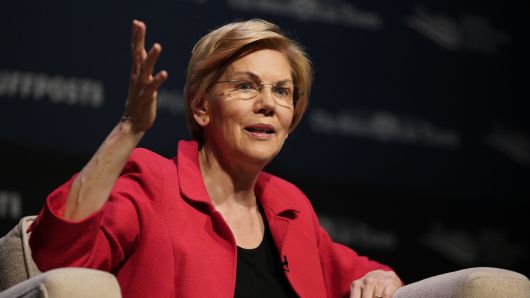CNBC: Big agriculture fights back against Sen. Elizabeth Warren’s call to break up industry

Democratic presidential candidate Sen. Elizabeth Warren, D-Mass., speaks at the Heartland Forum held on the campus of Buena Vista University in Storm Lake, Iowa, Saturday, March 30, 2019.
Jeff Daniels | @jeffdanielsca Published 5 April 2019
- “You’ve got these giant corporations that are making bigger and bigger profits for themselves, for their executives, for their investors, and they’re putting the squeeze on family farms, on small farms,” Warren says.
- The 2020 presidential candidate also wants to overhaul the government’s commodities checkoff program to make it voluntary for farmers to make payments.
- Big agribusiness groups suggest Warren’s policy proposals are detached from reality and say what’s needed is a focus on growing U.S. exports, not adding regulations.
Sen. Elizabeth Warren’s call to break up big agriculture has stirred a debate, but industry groups are fighting back, with one group saying her “proposals seriously miss the mark.”
“You’ve got these giant corporations that are making bigger and bigger profits for themselves, for their executives, for their investors, and they’re putting the squeeze on family farms, on small farms,” the Democratic presidential hopeful told attendees at the Heartland Forum in Storm Lake, Iowa, on Saturday. “Twenty years ago, 600 different outfits were selling seed; today it’s basically six.”
The senator also released a policy post on Medium last week that focused on “leveling the playing field for America’s family farmers.”
But big agribusiness groups suggest Warren’s policy proposals are detached from reality and say what’s needed is a focus on growing exports, not adding regulations.
The Massachusetts Democrat has criticized “immense market power” created by mergers and expansion, targeting seed giants, big chicken companies and meat processors. The Democrat also has vowed to install “trustbusters to review — and reverse — anti-competitive mergers.”
“We disagree with the premise and the policies outlined,” said Jim Monroe, a spokesman for the National Pork Producers Council, a trade group. “The U.S. pork production system is the envy of the world. It is also highly export dependent. What U.S. pork producers and the other American farm families need are expanded export opportunities, not more regulations.”
Warren has also been critical of the government’s commodity checkoff programs, funded by farmers, that are used to promote products such as soybeans, milk, beef and pork. She backs a bill, reintroduced last week by a bipartisan group of senators, to reform the commodity programs and wants farmer checkoff payments to be voluntary. She said the system is now “rigged against family farmers.”
“If Senator Warren’s goal is to help cattle farmers and ranchers, her policy proposals seriously miss the mark,” said Colin Woodall, senior vice president of government affairs for the National Cattlemen’s Beef Association, a trade group. “The ideas she outlines are nothing more than recycled policies promoted by some of the leading opponents of animal agriculture.”
Warren’s campaign did not respond to CNBC’s request for comment.
Warren also targeted recent mergers involving Bayer-Monsanto, Dow-Dupont and Syngenta-ChemChina — companies supplying seeds and other products to farmers. She singled out those companies last week in her policy post and called for the breakup of big agricultural mergers.
“Agriculture is a complex and highly competitive industry, and there are hundreds of companies driving innovation and competing for farmers’ business,” said Christi Dixon, a Bayer spokesperson. “After a robust global regulatory review process, we brought together two talented teams and a robust portfolio to offer more choices for farmers.”
Dow referred inquiries to the industry trade group. Syngenta declined comment.
“Much of the consolidation we have seen in recent years is the result of the need and desire of our members to continue to innovate and invest in new, more targeted technologies,” said Chris Novak, president and CEO of CropLife America, a biotech industry trade group.
Novak said companies require on average more than 11 years and some $300 million to bring a chemistry product to market. But the considerable time and hefty outlay needed to go through the regulatory process make it tough for small companies to make these investments, he said.
“Through the consolidation process, we have seen divestiture of assets that has allowed other companies to acquire new and more diverse portfolios,” he said. “This has created a more competitive marketplace.”
Warren’s policy paper said the two biggest seed makers, Monsanto and DuPont, together had just over 70 percent market share of the corn seed market before they were acquired.
She said “conservative estimates” have the merged Bayer-Monsanto with “more than 37 percent” domestic market share of the vegetable seed market and “more than half of the market for some vegetables.”
The National Farmers Union, a group representing family farmers, sides with Warren. The group is concerned about the impact of recent industry deals and testified against the three big seed mergers when they were still pending.
“When you get to a place in a sector of the economy where 40 to 50 percent of that business volume is represented by four or fewer players, you have by definition what most economists would say is a non-competitive [market], or at least a market that is less competitive than it ought to be,” said Roger Johnson, president of the group.
Johnson said farmers’ choice is more limited due to the mergers. He also said agricultural producers are “getting squeezed on both” ends by paying more than they should for products and getting lower prices when selling their commodities “because of highly concentrated markets that are paying less to us.”